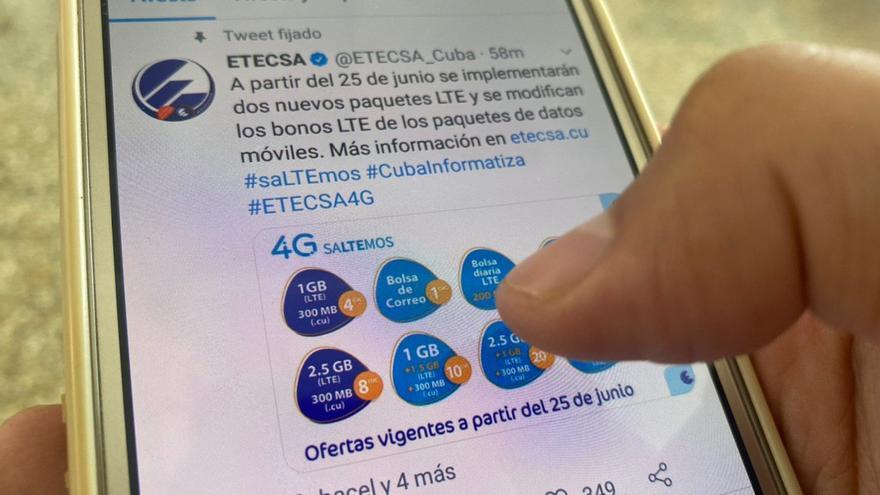
![]() 14ymedio, Havana, 22 June 2020 — On Monday, the Cuban Telecommunications Company (Etecsa) announced new mobile phone web browsing packages that will come into effect on June 25 with discounts for internet connection on the 4G network.
14ymedio, Havana, 22 June 2020 — On Monday, the Cuban Telecommunications Company (Etecsa) announced new mobile phone web browsing packages that will come into effect on June 25 with discounts for internet connection on the 4G network.
Among the new mobile data packages is 1 GB with an additional bonus of 1.5 GB to surf the Internet and 300 MB to access national sites, all for the price of 10 CUC (roughly $10 US, more than a week’s average wages). A package of 14 GB at 45 CUC was also implemented, with the national navigation bonus included, said the state monopoly on its Twitter account.
The rate that until now was charged for 10 GB will allow 14 GB, the highest volume package sold by the company so far. In addition, there will be offers from 1 GB at 4 CUC, 2.5 GB at 20 CUC, and 4 GB at 30 CUC, all with an extra bonus of 1.5 GB, 3 GB and 5 GB, respectively.
Etecsa will keep the option of 1 CUC for the nauta.cu email service and also 1 CUC, for the 200 MB package to be consumed within 24 hours. The 600 MB package will have a bonus of 800 MB LTE plus 300 MB navigation of national sites and will cost 7 CUC; the 400 MB package, with the same addition, will cost 5 CUC.
This Monday’s announcement has divided customers between those who applaud the sale and others who feel disappointed by the price of the packages. “I like the action of improving plans, just a suggestion: Do it at least twice a year,” said a user on Twitter.
At 45 CUC, the price of the 14 GB package represents the monthly salary of a doctor and many customers depend on top-ups made by family and friends abroad in order to pay the high service fees.
Among the most repeated criticisms was from those who consider that the price of 45 CUC should include a monthly flat rate in which the user does not pay for megabytes consumed, a long-standing demand from the customers of the telecommunications monopoly.
Others regretted that most of the new offers are directed at the 4G network, which is still not working across the country. “Now what we need is a 4G base station in order to benefit us, in my area there are two nearby base stations that continue in 2G, in the municipality of Caimito, Artemisa,” René Alexander complained.
“Very good Etecsa, very good. For the next one, include more national megabytes that lately have had more demand from users. I congratulate you but I know you can do more,” asked another who identified himself as Marlom.
Last May, with the hashtag #BajenLosPreciosDeInternet (Lower Internet Prices), Etecsa users called on the state company to reduce internet connection rates from mobile phones, public Wi-Fi areas and domestic service from homes through Nauta Hogar. Etecsa described the promoters of the campaign as “mercenaries,” according to several tweets and articles published this week in official media.
The campaign, which has been going on for a year as of this June, achieved making the hashtag a trending topic within the Island within just 24 hours, and has remained present on the networks every Saturday, with more or less enthusiasm.
The arrival of mobile phone internet service in Cuba occurred in December 2018. The Island was the last country in the region to allow its citizens to surf the internet through their cell phones, due to the Government’s efforts not to lose control over information.
At the end of 2018, the President Miguel Díaz-Canel allowed the sale of the first navigation plans with data. Cubans were able to buy their first cellphone lines in 2008, following reforms promoted by former president Raúl Castro.
___________________
COLLABORATE WITH OUR WORK: The 14ymedio team is committed to practicing serious journalism that reflects Cuba’s reality in all its depth. Thank you for joining us on this long journey. We invite you to continue supporting us by becoming a member of 14ymedio now. Together we can continue transforming journalism in Cuba.
